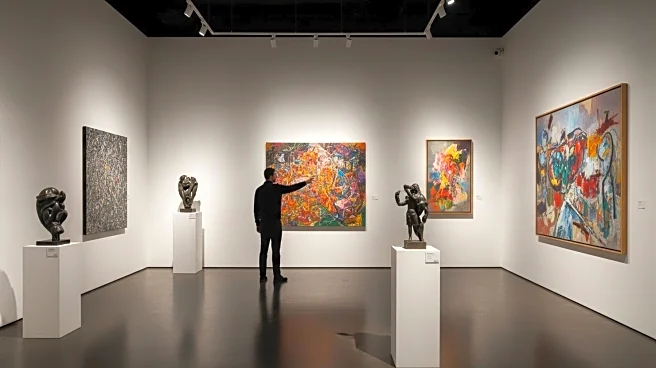What's Happening?
James Steward, director of the Princeton University Art Museum, has emphasized the importance of museums actively engaging with their communities in the face of increasing political scrutiny. Steward argues that museums should not remain silent but instead foster dialogue and debate, positioning themselves as centers of community life. He highlights the role of museums in providing fact-based contextualization and encouraging self-interrogation, especially in an era of disinformation. Steward's leadership at Princeton has seen the museum expand its exhibition program and outreach, doubling attendance. The museum is preparing to open a new facility in October, designed to promote cultural exchange and encounter.
Why It's Important?
The call for museums to actively engage with their communities is significant in the current polarized political climate. Museums, traditionally seen as neutral spaces, are increasingly under scrutiny for their narratives and commitment to diversity and inclusion. Steward's approach suggests that museums can play a crucial role in fostering civic dialogue and civil discourse, helping visitors understand their own experiences and empathize with others. This proactive stance could help museums retain public trust and support, ensuring they remain vital cultural institutions. The emphasis on ethical stewardship and representation also highlights the evolving role of museums in shaping social narratives.
What's Next?
Princeton University Art Museum is set to open a new facility on October 31, 2025, which aims to place cultural heritage on a more level playing field. This new space will focus on bridging cultural borders and fostering dialogue across geographies and chronologies. Steward's vision includes updating and expanding collections to give voice to historically marginalized groups, fostering participatory storytelling. As museums globally reconsider their practices, they may adopt similar approaches to engage with their communities and address contemporary challenges. The success of these initiatives could influence public policy and funding decisions related to cultural institutions.
Beyond the Headlines
The broader implications of Steward's advocacy for active engagement include potential shifts in how museums are perceived and funded. By embracing discomfort and unease as tools for discovery, museums can challenge preexisting views and promote critical thinking. This approach aligns with democratic values and enlightened citizenship, potentially influencing educational and cultural policies. As museums navigate political pressures, their ability to foster inclusive narratives and support diverse communities could redefine their role in society. Steward's leadership at Princeton serves as a model for other institutions seeking to balance ethical stewardship with community engagement.









